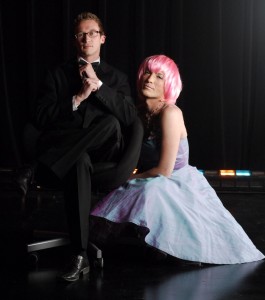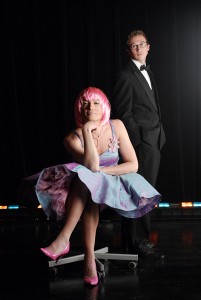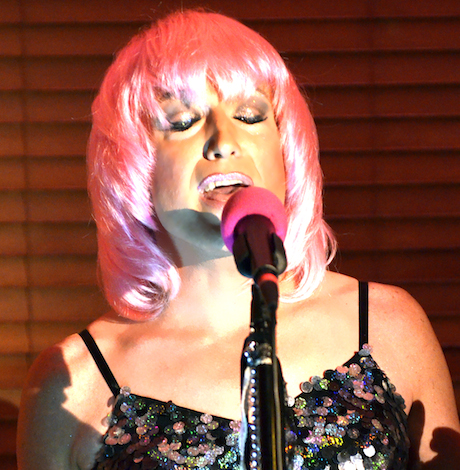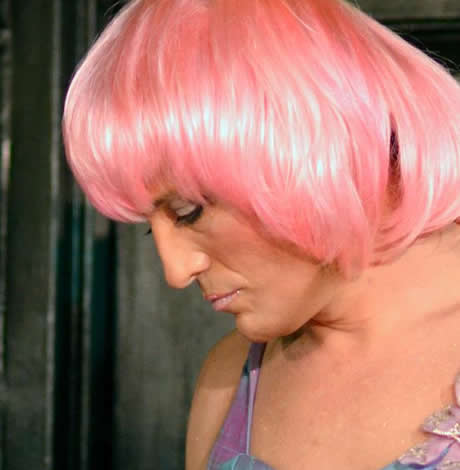Theater
Undercover agent
Creative restlessness, logistics spur Ganymede’s Jeffrey Johnson to new endeavors
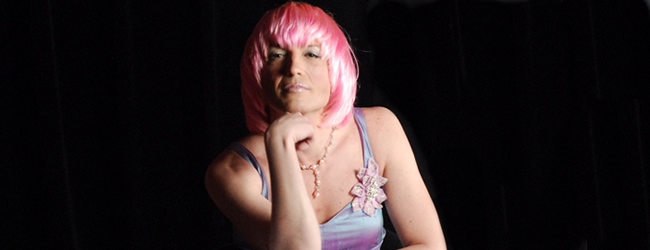
EDITOR’S NOTE: This event is over but go here for a review.
‘The Only Gal in Town’
Special Agent Galactica and Christopher Wingert
Dec. 31
8 p.m.
$10
Go Mama Go!
1809 14th Street, N.W.
- Special Agent Galactica (Jeffrey Johnson) and her accompanist Christopher Wingert. (Photos courtesy of Jeffrey Johnson)
New Year’s Eve is the birthday of Special Agent Galactica, the performance art drag persona of local gay actor Jeffrey Johnson. So despite logistical hurdles, she’s not letting the occasion pass un-noted.
“The Only Gal in Town,” Galactica’s cabaret act with musical wiz Christopher Wingert, is Dec. 31 at 8 p.m. at Go Mama Go!, the 14th Street shop where Ganymede Arts, the region’s only LGBT arts organization, hosted recent productions of “Falsettos” and “Edie Beale LIVE at Reno Sweeney.”
Galactica, who was born four years ago as one of four drag characters who did a New Year’s Eve show called “SEXE: the Floor Show,” has continued each year. But this year’s show is different in two major regards — Johnson, in a Galactica first, is doing all the vocals live and it’s not a Ganymede production.
Johnson, who had 11 years of musical theater experience under his belt before moving to D.C. in 1997, found his pipes reawakened when he played the lead in “Falsettos” in September. He’d been mostly directing and lip syncing the last decade-plus.
“I can always do more (lip syncing) and I’m not done with that at all, but I do kind of feel I just wanted to try something different and I’ve been inspired by some of the cabaret artists I’ve gotten to know so I thought, ‘This could be a lot of fun,'” Johnson says.
The original plan for “Falsettos” was for Johnson to only direct but an 11th-hour pass from a friend Johnson had tried to arm twist to play the lead resulted in Johnson playing main character Marvin. That production proved doubly influential for the New Year’s Eve show — it not only reawakened Johnson’s love of singing, he found a kindred artistic spirit with “Falsettos” musical director/pianist Christopher Wingert, who’s sharing billing with Galactica for next week’s show.
Wingert was an emergency sub for a performance of “Naked Boys Singing,” Ganymede’s May/June show. He did so well, Johnson hired him for a major role in “Falsettos.”
Wingert, who saw Galactica perform for the first time at this summer’s Fringe Festival, says he and Johnson click.
“We have a ton of fun,” he says. “Sticking to the work is sometimes the tricky part because we end up cracking each other up and going off on all kinds of tangents.”
Next week’s show will find Galactica singing songs by Stephen Sondheim, Quincy Jones, Ray Stevens, Rodgers and Hammerstein, Ann-Margaret, Dusty Springfield and others.
So what will Galactica — whom Johnson admits was conceived as a purposefully ambiguous personality capable of morphing into any guise the lip syncing material demanded — have to say now that she has the chance to speak? Some might shrug since “Falsettos” already proved Johnson can carry a tune, but for those who’ve seen Galactica’s many performances over the years — at Miss Pixie’s, at the Fringe or at ACKC — this is a huge paradigm shift.
Johnson says don’t expect any major soul baring a la Edie Beale’s New Year’s Eve cabaret act which Johnson has performed several times over the last couple years.
“Well, I hate cabaret shows where the people start talking,” he says. “Then it’s just me me me me me me me. I don’t really care. I just want to hear them sing. I didn’t come to hear them relay a life story. That seems a little bit of performance masturbation. So Galactica’s not a big talker. She lets the material speak for itself. I’m still trying to figure out what I need to say or what she would say between songs if she were lip syncing.”
Johnson has never gotten too wrapped up in notions of female illusion. It’s more about toying with notions of gender than trying to make people forget Galactica is played by a man. Subsequently he’ll be using his own vocal register in the show, not aping a higher female range.
“We’re not trying to give them an evening of Castrati,” he says. “It’s all part of the gender-fuck thing. But it’s a gentle gender fucking as it is a holiday.”
Wingert calls Galactica “a class act.”
“She’s a professional,” he says. “That’s the thing that really kind of seals the deal. Yeah, there are lots of performers and some are in wigs and some are not. But the ones that really have the polish and the stage presence to really nail it and just hit every mark every time, that’s very rare and Galactica really has that.”
The Ganymede board is behind Johnson’s venture. It just didn’t have enough money to stage the show itself. An artistically satisfying but financially draining year left the company depleted. “Naked Boys Singing” broke even. “Falsettos” probably would have, Johnson says, except that the company had to put about $10,000 into building a stage and seats in Go Mama Go’s back room after Miss Pixie’s landlord put the kibosh on anymore shows there. Both shows had high royalty fees as well.
“We had a terrific year,” says Ganymede board vice president Jim Bennett. “We put on some spectacular productions on a shoe-string budget and we had a lot of help but the money, in this economy, is just not readily available and we’re kind of always scrambling to make ends meet.”
The New Year’s Eve show will be divided into two acts. The first is voice and piano. A drummer and bass player will join Johnson and Wingert in the second half. It’ll also be over about 9:15 so attendees will have plenty of time to get to the spot in which they want to ring in the new year. Drinks, snacks and champagne will be served. JR.’s and Johnson’s friend, Patrick Vanas, are making donations for that.
So what inspires Johnson to continue forging ahead despite modest payoffs? He admits it’s been “really hard” to reconcile Ganymede’s near-pristine critical record the lack of grant funding and widespread regional support.
“Just being able to do these things is the biggest payoff,” he says. “Having the outlet. When I don’t have the outlet I get extremely depressed, moody. So it’s just that I’m grateful to have it … as a person, I’m artistically fulfilled. As an artistic director of a company, I think there’s a lot left to be desired … there’s no bragging rights to say you’re a patron of Ganymede like there is at Studio, or Arena, or to say, ‘Oh, I’m a patron of the Kennedy Center.’… Sometimes I don’t feel the community support is there.”
Bennett says anyone who hasn’t seen Johnson perform as Galactica should.
“He’s very talented and puts 110 percent into everything he does and he does it to perfection,” he says. “The kid has a lot of talent and a lot of dedication. I would love to see him be a really big star someday because he’s so committed to his art. If you have not yet seen him in this type of performance, you have to go. He is just terrific.”
Theater
Voiceless ‘Antony & Cleopatra’ a spectacle of operatic proportions
Synetic production pulls audience into grips of doomed lovers’ passion
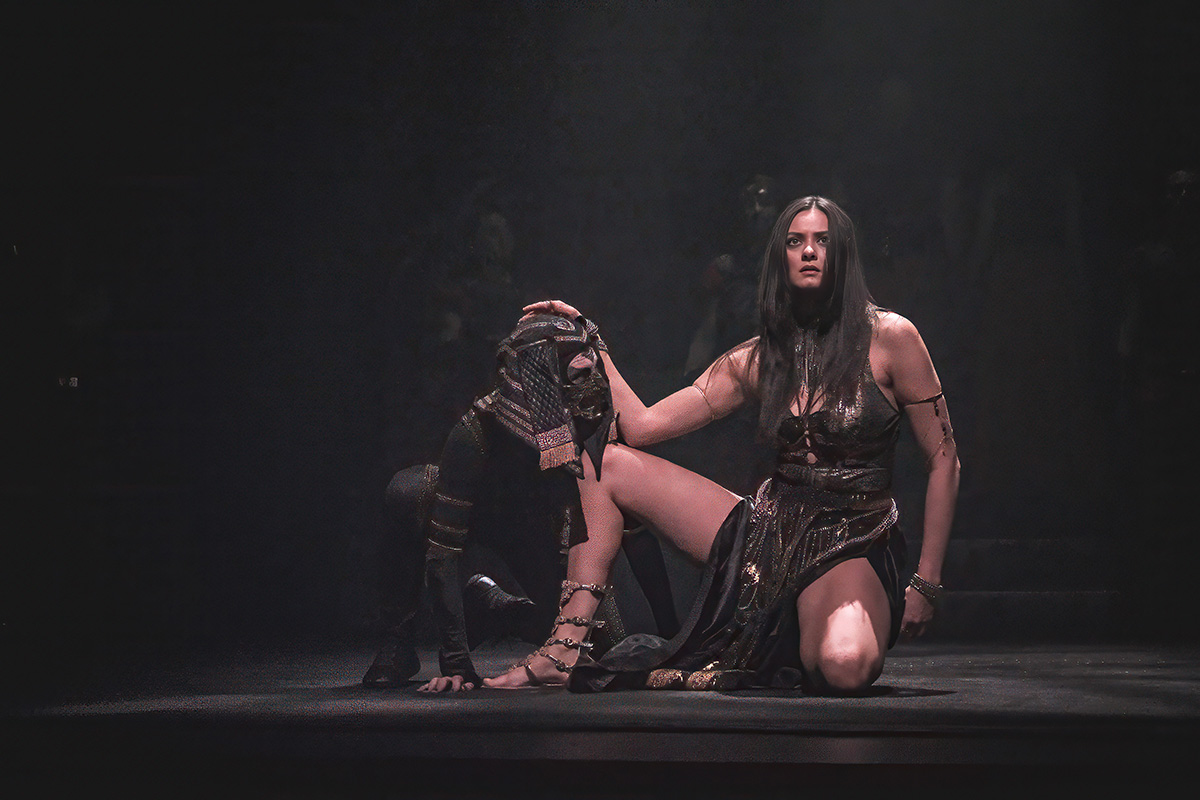
‘Antony & Cleopatra’
Through Jan. 25
Synetic Theater at
Shakespeare Theatre Company’s Klein Theatre
450 7th St., N.W.
Synetictheater.org
A spectacle of operatic proportions, Synetic Theater’s “Antony & Cleopatra” is performed entirely voiceless. An adaptation of the Bard’s original (a play bursting with wordplay, metaphors, and poetic language), the celebrated company’s production doesn’t flinch before the challenge.
Staged by Paata Tsikurishvili and choreographed by Irina Tsikurishvili, this worthy remount is currently playing at Shakespeare Theatre Company’s Klein Theatre, the same venue where it premiered 10 years ago. Much is changed, including players, but the usual inimitable Synectic energy and ingenuity remain intact.
As audiences file into the Klein, they’re met with a monumental pyramid bathed in mist on a dimly lit stage. As the lights rise, the struggle kicks off: Cleopatra (Irina Kavsadze) and brother Ptolemy (Natan-Maël Gray) are each vying for the crown of Egypt. Alas, he wins and she’s banished from Alexandria along with her ethereal black-clad sidekick Mardian (Stella Bunch); but as history tells us, Cleopatra soon makes a triumphant return rolled in a carpet.
Meanwhile, in the increasingly dangerous Rome, Caesar (memorably played by Tony Amante) is assassinated by a group of senators. Here, his legendary Ides of March murder is rather elegantly achieved by silver masked politicians, leaving the epic storytelling to focus on the titular lovers.
The fabled couple is intense. As the Roman general Antony, Vato Tsikurishvili comes across as equal parts warrior, careerist, and beguiled lover. And despite a dose of earthiness, it’s clear that Kavsadze’s Cleopatra was born to be queen.
Phil Charlwood’s scenic design along with Colin K. Bills’ lighting cleverly morph the huge pyramidic structure into the throne of Egypt, the Roman Senate, and most astonishingly as a battle galley crashing across the seas with Tsikurishvili’s Antony ferociously at the helm.
There are some less subtle suggestions of location and empire building in the form of outsized cardboard puzzle pieces depicting the Mediterranean and a royal throne broken into jagged halves, and the back-and-forth of missives.
Of course, going wordless has its challenges. Kindly, Synectic provides a compact synopsis of the story. I’d recommend coming early and studying that page. With changing locations, lots of who’s who, shifting alliances, numerous war skirmishes, and lack of dialogue, it helps to get a jump on plot and characters.
Erik Teague’s terrific costume design is not only inspired but also helpful. Crimson red, silver, and white say Rome; while all things Egyptian have a more exotic look with lots of gold and diaphanous veils, etc.
When Synetic’s voicelessness works, it’s masterful. Many hands create the magic: There’s the direction, choreography, design, and the outrageously committed, sinewy built players who bring it to life through movement, some acrobatics, and the remarkable sword dancing using (actual sparking sabers) while twirling to original music composed by Konstantine Lortkipanidze.
Amid the tumultuous relationships and frequent battling (fight choreography compliments of Ben Cunis), moments of whimsy and humor aren’t unwelcome. Ptolemy has a few clownish bits as Cleopatra’s lesser sibling. And Antony’s powerful rival Octavian (ageless out actor Philip Fletcher) engages in peppy propaganda featuring a faux Cleopatra (played by Maryam Najafzada) as a less than virtuous queen enthusiastically engaged in an all-out sex romp.
When Antony and Cleopatra reach their respective ends with sword and adder, it comes almost as a relief. They’ve been through so much. And from start to finish, without uttering a word, Kavsadze and Tsikurishvili share a chemistry that pulls the audience into the grips of the doomed lovers’ palpable passion.
Theater
Ford’s ‘First Look’ festival showcases three new productions
A chance to enjoy historical dramas for free before they’re completed

The Ford’s Theatre Legacy Commissions: A First Look – 2026
Jan. 16 & 17
Ford’s Theatre
511 Tenth St., N.W.
FREE
Fords.org
When Ford’s Theatre debuted its new plays festival, “A First Look,” in 2023, it was unclear whether people would come for the staged readings.
“Before the pandemic if you announced the reading of a play, 12 people might show up,” says José Carrasquillo, director of artistic programming at Ford’s Theatre. “Since then, we’ve experienced comparatively massive turnout. Maybe because it’s cheap, or because of the very newness of the works.”
This year’s fourth edition showcases readings of three pieces currently in varied stages of development. The free, two-day festival offers audiences a chance to encounter historical dramas long before they’re completed and fully produced. None are finished, nor have they been read publicly. And befitting the venue’s provenance, the works are steeped in history.
The festival kicks off with “Springs” by playwright Jeanne Sakata and directed by Jessica Kubzansky. Commissioned by The Ford’s Theatre Legacy Commissions, it’s the both epic and personal story of Sakata’s Japanese American family including her grandfather’s experience in an internment camp.
“Sakata’s immigrant grandfather was an exceptionally skilled farmer who helped to stave off starvation in the camp. Still, he never gave up on the idea that he belonged in America. It’s very much a story of today,” says Carrasquillo.
Unlike “Springs,” the festival’s two other works weren’t commissioned by Ford’s. But they both fit the history brief and likely will benefit from the exposure and workshopping.
“Providence Spring,” by California based playwright Richard Helesen and directed by Holly Twyford, portrays Clara Barton (played by local favorite Erin Weaver) as a hero beyond the Red Cross whose then-radical initiatives included cataloguing the Civil War dead, many pulled from mass graves.
Directed by Reginald L. Douglas, “Young John Lewis: Prodigy of Protest” explores a slice from the life of the legendary civil rights activist and longtime congressman. With book and lyrics by Psalmayene 24 and music by Kokayi this collaboratively staged reading between Ford’s and Mosaic Theater is slated to premiere fully produced at Mosaic as a 90-minute musical in the spring of 2026.
“When I was hired at Ford’s in 2018, we began discussing hiring writers who do historical drama,” says Carrasquillo. “Our intention was resolute, but we didn’t do it right away. It took getting through the pandemic to revisit the idea.”
At the same time, the racial reckoning spurred Ford’s to hire playwrights of color to tell stories that had previously been forgotten or ignored.
For Carrasquillo, who is gay, the impulse to commission was crystalized when he saw the film “Hidden Figures,” a true story about “three brilliant African-American women — at NASA during the Space Race, overcoming racial and gender discrimination to make crucial contributions to America’s spaceflight success.” He says, “the film floored me. How many stories like this are there that we don’t know about?”
One of the festival’s happiest experiences, he adds, was the commission of playwright Chess Jakobs’s “The American Five” and its subsequent success. It’s the story of Martin Luther King Jr. and his inner circle, including Bayard Rustin (MLK’s brilliant, unsung gay adviser) leading up to the 1963 March on Washington. The play later premiered fully produced in Ford’s 2025 season.
Increasingly, the readings at Ford’s have become popular with both artists and audiences.
At Ford’s, Carrasquillo wears many hats. In addition to selecting plays and organizing workshops, he serves as an in-house dramaturg for some of the nascent works. But he’s not alone. Also helming the festival are senior artistic advisor Sheldon Epps, and The Ford’s Theatre Legacy Commissions advisor Sydné Mahone.
Because the plays are in development, comments from directors, dramaturgs, and the audience are considered and may become part of the playwrights’ rewrites and changes. If and when the play resurfaces fully produced, audience members might find their suggestion in the completed work.
Is this year’s festival queer influenced? Yes, both by those involved and the topics explored.
Carrasquillo explains, “While Sakata’s “Springs” is primarily about immigration, its message is relevant to the queer community. Civil rights are being taken away from us. We need this playwright’s story to know what has happened and what can happen to any of us.
“Many of Ford’s legacy commissions underscore the importance of civil rights in our country and that’s important to all of us. Queer and not queer.”

It’s been a year filled with drama and music, re-imaginings and new works. There was a lot on offer in 2025, and much to enjoy. Here are 10 now-closed productions that come to mind.
On Valentine’s Day at Folger Theatre on Capitol Hill, out actor Holly Twyford served as narrator for “The Love Birds” a Folger Consort work that melds medieval music with a world-premiere composition by acclaimed composer Juri Seo and readings from Geoffrey Chaucer’s “A Parlement of Foules”
Standing behind a podium, Twyford beautifully read Chaucer’s words (translated from Middle English and backed by projected slides in the original language), alternating with music played on old and new instruments.
While Mosaic Theater’s “A Case for the Existence of God,” closed in mid-December, it’s proving a production not soon forgotten. Precisely staged by Danilo Gambini, and impressively acted by Lee Orsorio and Jaysen Wright, the soul-searching two hander by out playwright Samuel D. Hunter, tells the story of two men who form an unlikely friendship based on single-fatherhood, a specific sadness, and hope.
The action unfolds in a small office in southern Idaho, where the pair discuss the perplexing terms of a mortgage loan while delving deep into their lives and backgrounds. Nothing is left off the table.
Shakespeare Theatre Company’s spring production of “Uncle Vanya” gave audiences something both fresh yet enduring. Staged by STC’s artistic director Simon Godwin, the production put an impeccably pleasing twist on Russian playwright Anton Chekhov’s classic. It ranks among the very best area productions of the year.
Featuring a topnotch cast led by Hugh Bonneville (TV’s “Downton Abbey”) in the title role, the play was set on an unfinished stage cluttered with costume racks and assorted props, all assembled by crew uniformed in black and actors in street clothes. Throughout the drama tinged with comedy, the actors continued to assist with ever increasingly period set changes accompanied by an underscore of melancholic cello strings. It was innovative and wonderful.
GALA Hispanic Theatre’s production of Manuel Puig’s “Kiss of the Spider Woman” was an intimate and affecting piece of theater. Staged by José Luis Arellano, it starred out actors Rodrigo Pedreira and Martín Ruiz as two very different men whose paths cross as convicts in an Argentine prison.
Arena Stage scored with a re-imagined and updated take on the widely liked musical “Damn Yankees.” Directed by Sergio Trujillo, the Broadway bound production has been “gently re-tooled for its first major revival in the 21st century,” moving the action from the struggling Washington Senators baseball team to the turn-of-the-century Yankees lineup. Ana Villafañe’s charmingly seductive Lola and a chorus of fit ball players made for a good time.
Also at Arena, out playwright Reggie D. White’s new work “Fremont Ave.” was very well received. A semi-autobiographical glimpse into home and the many definitions of that idea specifically relating to three generations of Black men, the work boasts a third act with a deeply queer storyline to boot.
Before his smash hit “Hamilton” transformed Broadway, Lin-Manuel Miranda wrote “In the Heights,” a seminal musical set against the vicissitudes of an upper Manhattan bodega. Infused with hip-hop, rap, and pop ballads, the romance/dramedy takes place over a lively few days in the vibrant, close-knit Latin neighborhood, Washington Heights.
Signature Theatre’s exciting take on “In the Heights” featured a talented cast including out actor Ángel Lozado as the bodega owner who figures prominently in the barrio and the action.
Studio Theatre’s recent production of lesbian playwright Paula Vogel’s newest work “The Mother Play,” a drama with humor, is about a well put together alcoholic mother and her two gay children living under difficult circumstances in the less glitzy parts of suburban Maryland. With nuanced performances and smart direction, the production was terrific.
Keegan Theatre surpassed expectations with its production of “Lizzie” a punk rock opera about Miss Borden, the fabled axe wielding title character. Performed by a super all-female cast, they belted a score that hits hard on subjects like money, queerness, and strained (to say the least) family relationships.
Round House Theatre impressed autumn audiences with “The Inheritance,” a two-part drama sensitively staged by out director Tom Story and acted by a mostly queer cast that included young actor Jordi Bertrán Ramírez in a breakout performance.
Penned by out playwright Matthew López, the epic work inspired by E.M. Forster’s novel “Howards End,” explores themes of love, legacy, and the AIDS crisis through the lives of three generations of gay men in New York City.
Prior to opening, Story commented that with the production’s predominately queer cast you get actors who “really understand the situation, the humor, and the struggle. It works well.” And he was right.

